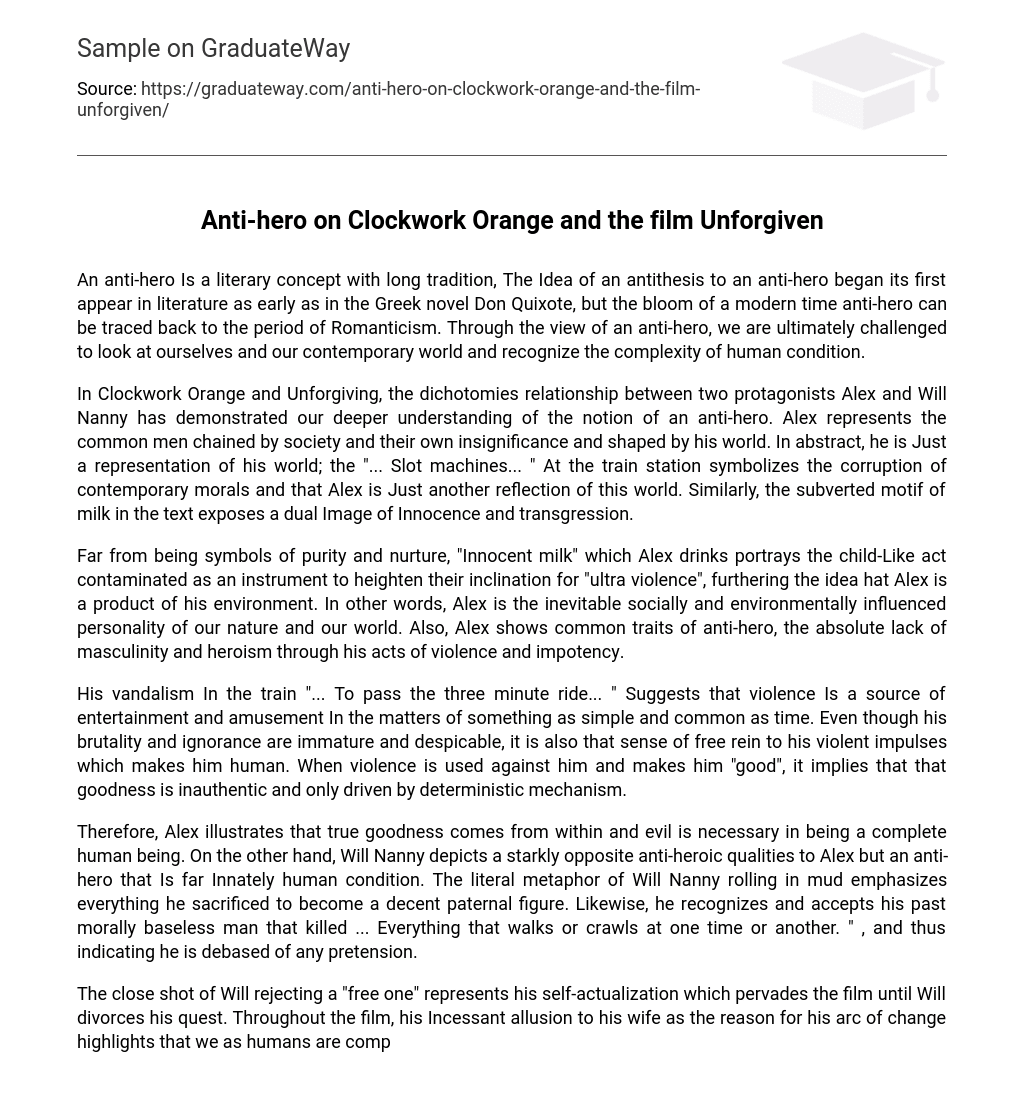The idea of an anti-hero has a rich history in literature, originating from the Greek novel Don Quixote and becoming more popular during the Romanticism era. Contemporary anti-heroes delve into the intricacies of human existence, prompting us to contemplate both ourselves and our modern society.
In both Clockwork Orange and Unforgiving, the characters of Alex and Will Nanny exemplify the contrasting relationship between two protagonists, providing a profound insight into the concept of an anti-hero. Alex symbolizes the ordinary individuals who are restrained by societal norms and their own insignificance, molded by the environment they inhabit. In essence, he is merely a manifestation of his surroundings; the presence of slot machines at the train station serves as a metaphor for the deterioration of contemporary morals and emphasizes that Alex is just another reflection of this decadent world. Likewise, the symbolic use of milk throughout the text highlights a dual representation of purity and transgression.
The consumption of “Innocent milk” by Alex is not a symbol of purity and nurture, but rather a tainted representation of childlike behavior used to enhance his inclination for “ultra violence.” This suggests that Alex is a product of his environment, highlighting the influence of society and the environment on his personality. Additionally, Alex exhibits characteristics commonly associated with an anti-hero, displaying a complete absence of masculinity and heroism through his violent and impotent actions.
His act of vandalism on the train implies that violence serves as entertainment in even the most ordinary aspects of life, such as time. Although his brutality and ignorance are reprehensible, they also highlight his humanity by allowing him the freedom to express his violent impulses. However, when violence is used against him and forces him to act “good,” it suggests that this goodness is not genuine but rather a result of external determinants.
Alex demonstrates that true goodness originates from within and acknowledges the importance of evil in shaping a well-rounded individual. In contrast, Will Nanny portrays anti-heroic characteristics that are strikingly different from Alex, yet they reflect the inherently human nature. Will Nanny’s literal metaphor of rolling in mud highlights the sacrifices he made to become a respectable surrogate father figure. Moreover, he acknowledges and accepts his morally bankrupt past as someone who has killed indiscriminately. This admission underscores his lack of pretension or falsehood.
The scene where Will turns down a “free drink” symbolizes his self-discovery, a theme that runs through the entire film until he gives up on his journey. Will consistently refers to his wife as the catalyst for his transformation, emphasizing the multifaceted and perplexing nature of human beings. Furthermore, the harsh and barren backdrop of the old west serves as a perfect setting for an anti-hero. In this unforgiving environment, Will’s financial struggle forces him to make morally questionable choices in order to survive and enables him to justify villainous actions for noble purposes.
Additionally, in the Old West, the lack of law and order amplifies the importance of the sheriff as the embodiment of law. This is similar to Will’s merciless enforcement tactics. Moreover, Little Bill serves as a contrasting character, emphasizing the use of violence in Will’s morally ambiguous journey. Through Will, we observe the inherent development of wounded humanity within society. By comparing Will to Alex and Nanny, who represent both good and evil, we can understand Will as a complete depiction of an anti-hero, characterized by the use of violence and ironic moral complexity.
Despite their differing backgrounds and vulnerabilities, both protagonists use violence either to protect their individuality or to stay alive. At the end of the story, Will’s dark side emerges again, showing that he has failed to maintain his nobility. Similarly, Alex is denied the opportunity to make choices, which represents the absence of free will and the existence of one’s self. Furthermore, the way Will and Alex are depicted as anti-heroes visually encourages us to contemplate our own self-realization and leads us to have mixed feelings of hatred and moral uncertainty towards these characters.
They are depicted as having flaws but staying true to themselves, displaying genuine human characteristics. In conclusion, these contrasting characters are juxtaposed and merged to portray two anti-heroes who we can realistically and sympathetically relate to, despite their undesirable qualities. This further highlights their importance and the essential role they play in human nature. Thus, the realistic traits of an anti-hero demonstrate the intricate nature of humanity and ultimately establish a connection between their unconventional greatness and our own world and humanity.





